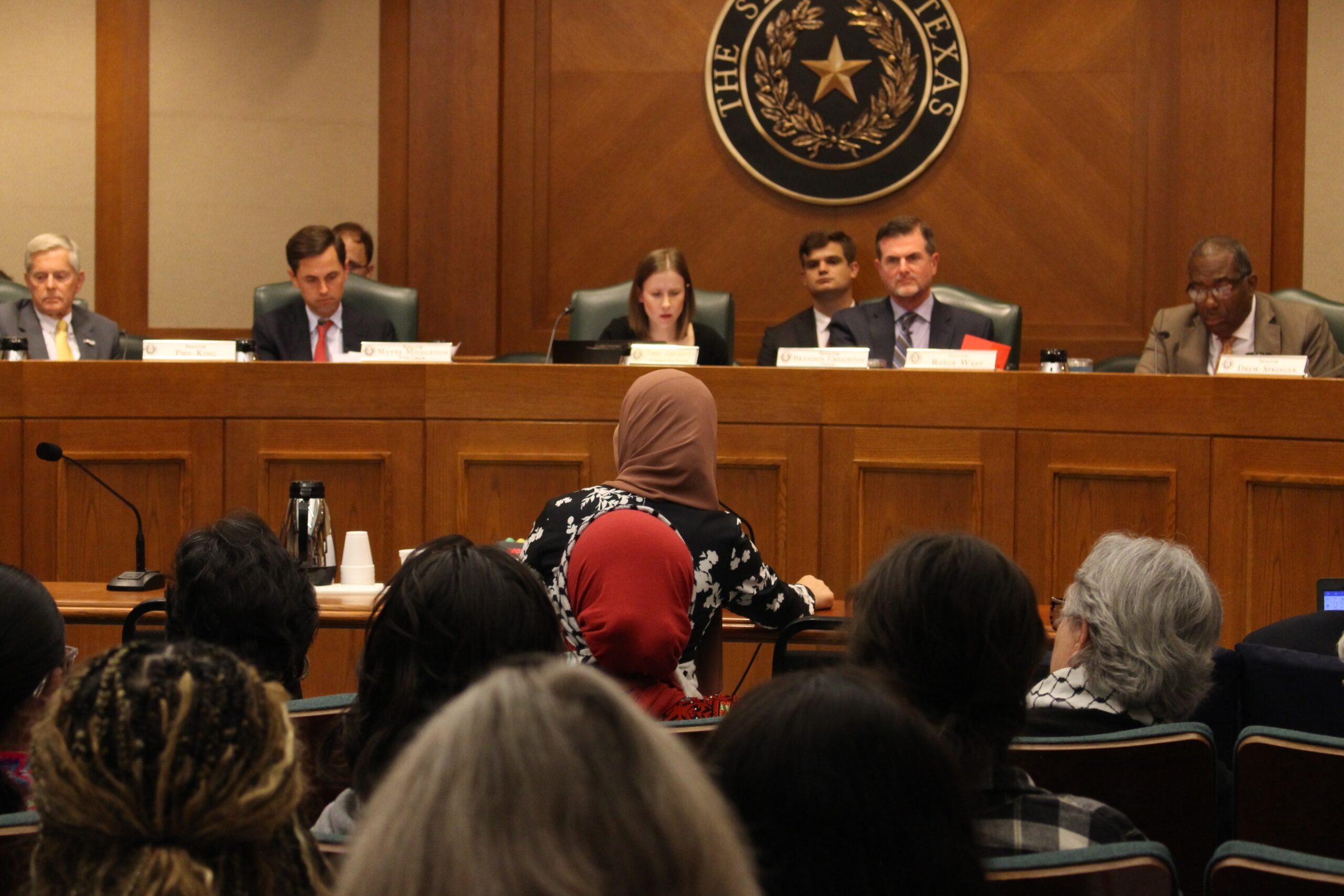
Texas resident testifies at state legislative hearing on "anti-DEI" Senate Bill 17 on May 14, 2024. Credit: Angela Lim
Community members defend DEI, free speech at Texas Senate hearing
Students, faculty and community members packed a Tuesday Texas Senate hearing on antisemitism and free speech on college campuses and university leaders’ efforts to comply with Senate Bill 17, which bans diversity, equity and inclusion initiatives at state universities.
Since that law took effect on Jan. 1, Texas public universities have dissolved DEI offices, positions, and services that support marginalized students. In a letter sent to public university system chancellors in March, state Sen. Brandon Creighton, R-Conroe, the author of the bill, requested information on how institutions have been following its provisions, and for representatives to report their progress at the Senate subcommittee on higher education hearing. Renu Khator, the University of Houston System chancellor, said the UH System has eliminated DEI training and upheld merit-based hiring.
Angel Huang, a junior at the University of Texas at Austin, said the Monarch program provided scholarships for her friend who is undocumented and relies on financial aid to attend college. UT discontinued Monarch even though it served students of various racial backgrounds and genders, which critics say should have complied with Section C of the UT System’s SB 17 working guidance. At the hearing, Creighton acknowledged that the UT System made decisions that “go beyond the scope of the bill.”
Huang signed up to testify and said she feels like she and her fellow students have to constantly prove to lawmakers that their struggles exist.
“It’s like the idea of ‘pull yourself up by [your] bootstraps,’ but we don’t have boots. We don’t have straps,” said Huang, the program director of Students Engaged in Advancing Texas. “We’re literally barefoot. And for them, they’re so privileged that they cannot see and understand that there are people out there who do not have shoes.”
Nearly 150 people gave public testimony, many of whom demanded the committee to repeal the law, reinstate DEI offices, and clarify the language used in the bill. Ash Hall, a policy and advocacy strategist at the American Civil Liberties Union of Texas, emphasized the importance of on-campus spaces for LGBTQ+ students. According to a 2022 Trevor Project survey, 74 percent of LGBTQ+ youth in Texas were discriminated against for their gender identity and sexuality. Hall said the Gender and Sexuality Center at UT Austin also made HIV and AIDS testing more accessible for students.
“Not only did the Gender and Sexuality Center save my life, but I witnessed it do the same for other students,” Hall said.
Students and community members also testified against UT’s militarized response to pro-Palestine protests, which they said were peaceful until law enforcement intervened. In March, Gov. Greg Abbott issued an executive order that required Texas higher education institutions to revise their free speech policies in a way that combats “antisemitic rhetoric.” Abbott singled out the Palestine Solidarity Committee and Students for Justice in Palestine as groups that must be penalized should they violate university rules. UT suspended the PSC after its April 24 protest on the South Lawn — which planned to have teach-ins, study breaks, and an art workshop — that was met with violence and intimidation from state troopers in riot gear, according to organizers. Following the suspension, the PSC can no longer host events and demonstrations on university grounds.
“This free speech that students are expressing are for a free Palestine and has nothing to do with anyone’s religion, but against the annihilation of Palestinian Christians, Muslims, and Israeli Jews who are fighting against the Netanyahu government’s mass murder of innocents in the West Bank and in Gaza,” said Amina Ishaq, a licensed clinical social worker and psychotherapist based in the Houston area.
Since Oct. 7, more than 35,000 civilians have been killed during Israel’s military campaign in the Gaza Strip, according to the Gaza Health Ministry. Creighton conflated the Pro-Palestinian cause with antisemitism, a position with which several witnesses disagreed. UT government professor David Albert, who is Jewish, said that criticizing Israel’s actions and occupation of Palestine is not antisemitic.
UT student Levi Fox spoke about experiencing antisemitism on campus, but the subcommittee did not extend the same opportunity for Palestinian, Arab and Muslim students to discuss Islamophobia.
“I wish to ask this committee and chairman, why is this committee not addressing both of these sickening forms of racism and bigotry today?” Albert said. “Because Arabs and Muslims are also your fellow Texans, and they deserve to have a hearing and to have their pain heard and expressed.”
Creighton said previous DEI initiatives did not improve faculty and staff recruitment from minority groups. However, Ruben Salazar, a senior at the UH-Downtown, said DEI programs helped him imagine the possibilities of where he could go in higher education as a Hispanic student from a working-class family and neighborhood. He was introduced to graduate programs and career options in public policy through the 2022 PPIA Public Service Weekend at UT’s Lyndon B. Johnson School of Public Affairs, which brought together students from historically underrepresented backgrounds. He said students need equitable resources to succeed.
“Texas is taking ten steps back instead of taking a step forward,” Salazar said. “We’re creating a more marginalized, less diverse community in Texas. I believe it’s going to negatively impact us for generations to come.”
